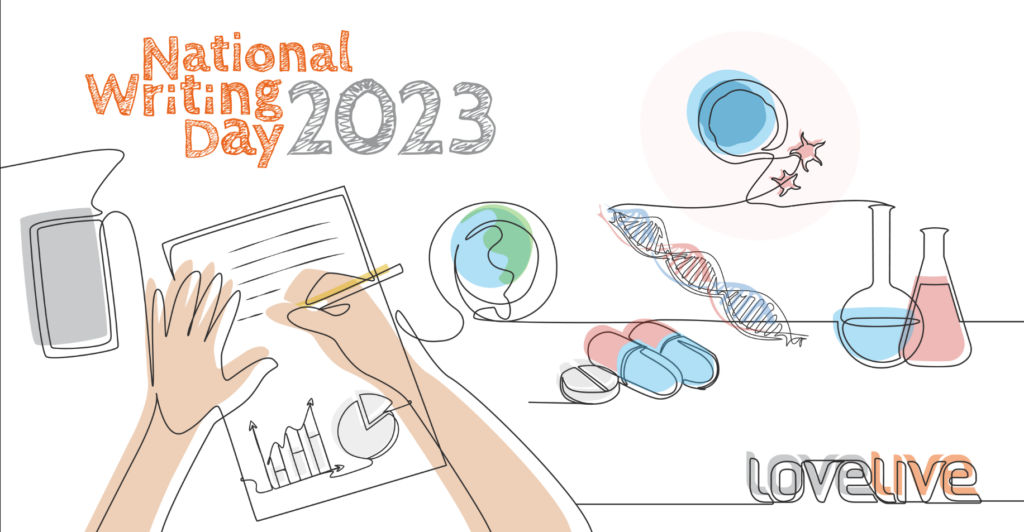It’s National Writing Week, and here at LOVELIVE we found the perfect way to celebrate. We are excited to introduce a special guest – Matthew Hallam! He has been a medical writer for half a decade now, and wrote a post about his experiences in the career so far.
Even though working with medical writing is a daily occurrence for the LOVELIVE team, being able to read about the med comms world through Matt’s point of view has been fascinating, and we hope that you will find it as interesting as we did…
Misinformation spreads like wildfire online. During the recent pandemic, misinformation regarding COVID-19 had a tangible human cost.1 Today, the true cost of false facts – and wider science illiteracy – is hard to quantify. This issue highlights a chasm separating the scientific community from the public. Bridging this gap could earn trust, inspire talent, and protect people (albeit largely from themselves). This was my key motivation for seeking a career in science communication – that, and the fact that I was not particularly talented in the lab.
The fall into medical communications (or ‘med comms’) was less expected, but is a topic I thought could be fun to explore for National Writing Day 2023. I’ve got around six years of experience in the field – plus two more if you want to count a brief hiatus to explore the world of chemistry magazine publishing – and am still consistently challenged and excited by the work that comes my way. But what is med comms? And what does a career in the field look like?
Simply put, med comms covers the communication of medical and scientific information to the audiences that need it through key deliverables. This audience is usually medical and pharmaceutical professionals – think physicians, researchers, and drug development teams. The deliverables are primarily manuscripts for medical journals and materials for medical events (such as presentations for international conferences and drug launch events). Supporting medical events also affords the opportunity to travel. Though my med comms escapades have only taken me as far as Dublin, a quick google tells me that this year’s European Conference on General Thoracic Surgery is being held in Milan and the American Society of Hematology meeting is happening in San Diego.

There are also a range of other projects that you can work on as a Medical Writer. In recent years, there has been a shift towards the production of patient-centric materials, including plain language summaries of complex information and educational posters. The idea is to encourage patients to learn about and participate in their own healthcare. Health literacy improves the capacity of patients to seek out, understand, and act upon medical information (such as that provided by their healthcare provider).2 Knock-on effects include the increased participation of patients in their care, higher levels of treatment satisfaction, and potentially improved outcomes.3,4
So, what does a typical day in med comms look like? That will depend on how you’re connected to the field. As a freelancer, I spend my time producing many of the materials discussed above (largely manuscripts describing clinical trials), but have also dabbled in training decks, advisory board reports, conference coverage, and much more. As a regular employee, your day will be split between writing and maintaining relationships with clients. A typical Medical Writer will juggle multiple projects alongside meetings with key stakeholders and various ad hoc requests. It’s a fast-paced environment where deadlines lurk around every corner, but it can also be incredibly rewarding.
The most obvious reward that comes to mind is seeing your work published in prestigious journals and presented at big conferences. Then there is the simple satisfaction of a job well done when a client sings your praises. For me, though, there is something special about connecting with and learning from leading scientific minds around the world. Doing so has allowed me to stay privy to advances in the therapy areas that I’ve become familiar with, including oncology, infectious diseases, and haemophilia. I also owe my formative writing training to med comms… A blog post written by me would have been much muddier circa 2015, when I started my first Associate Medical Writer position.
Med comms isn’t an industry that many people know much about, but it appealed to me because it combined my two main professional interests: writing and science. There are a handful of careers out there that offer this same combination – mainly in the journalism world – but they can be hard to come by, and even harder to infiltrate without relevant experience. What’s more, these jobs can pay poorly and often afford few opportunities for progression. This isn’t the case in med comms. Pay is fair and the ladder can be climbed if you’re willing to put in the effort. Plus, the industry is growing: the clinical communications and collaboration market in the US was valued at around $1.6 billion in 2020 and is expected to reach just under $5 billion by 2027.5
Medical Writers improve clinical care by empowering researchers, physicians, and patients. So, while misinformation may be rife online, I hope we can all sleep a tad easier at night knowing that med comms professionals (like me!) are working hard to get accurate information to the healthcare providers and patients that will benefit from it most.
References
- Islam MS, et al. Am J Trop Med Hyg 2020;103(4):1621–1629.
- Paterick TE, et al. Proc (Bayl Univ Med Cent) 2017;30(1):112–113.
- Thomas EN, et al. BMJ Qual Improv Rep 2017;6(1):u207103.w3042.
- Adams RJ. Risk Manag Healthc Policy 2010;3:61–72.
- Grand View Research, Inc. Report ID: GVR-4-68038-788-9 (2020). Available at: https://tinyurl.com/2p8e3uvu (Accessed June 2023).

